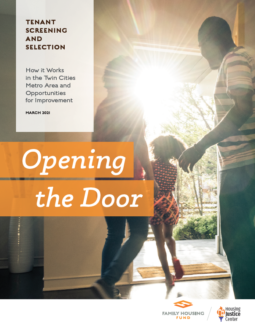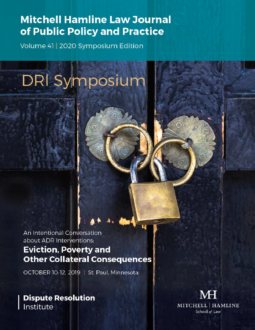Together, we can ensure a fair and predictable marketplace. Family Housing Fund and our partners work to expand opportunities and increase access to affordable housing in the Twin Cities region. Our vision is that the housing market will be fair and predictable, and that low- and moderate-income families will have equitable access to opportunities to build wealth and live in healthy, affordable homes throughout the region.
Reducing involuntary moves and displacement
Evictions destabilize families and communities. We support a comprehensive strategy to improve housing stability by reducing involuntary moves and displacement for low-income and BIPOC families.
FHFund distributed millions of dollars of emergency rental assistance to keep families housed after the onset of the COVID-19 pandemic. Building on our pandemic learnings, we continue working to increase access to financial assistance. Currently, we are leading a collaborative co-design process to produce recommendations for improving emergency financial assistance.
With many partners, we co-developed a court-based Housing Clinic model that provides on-site coordination of legal, financial, mediation and social services to households facing eviction. We work across multiple counties to implement process changes in the courts that reduce evictions and increase housing stability.
We work with mediation organizations to increase awareness of and expand access to mediation services across the region, so that landlords and tenants try mediation before evictions are filed.
Ensuring homes are decent and affordable
Family Housing Fund is working to ensure the health and safety of the region’s housing stock and to enhance its long-term physical and economic viability. With help from our partners in the community, local government, the rental housing industry, and public interest law, we are developing strategies to prevent and identify buildings suffering from substandard conditions or management. This work is helping cities, communities, and renter households enforce habitability codes and covenants while preventing involuntary renter displacement.
We support nonprofit legal service providers in helping low-income renters address problematic housing conditions that threaten their health and safety. By building bridges between legal service partners, community organizations, municipal partners, and financial resources for habitability, we strengthen the housing system’s ability to improve rental housing quality without displacing renters. Because habitability concerns are frequently at the root of eviction cases, proactive habitability litigation also prevents evictions and supports overall housing stability.
Family Housing Fund works with HousingLink and the Minnesota Home Ownership Center to provide online training modules and other support resources designed for small, part-time, and new rental property owners to ensure they are equipped to maintain the health and safety of their rental properties.
Improving rental screening practices and mortgage credit application standards
Low-income renters with low or nonexistent credit scores, criminal history, or prior evictions often struggle to access quality affordable housing due to common tenant screening and selection practices. Likewise, mortgage underwriting practices often fail to consider the relevant qualifications of an applicant, creating barriers to homeownership for BIPOC households, in particular. Family Housing Fund and our partners are leading efforts to assess and improve tenant selection and mortgage lending practices across the Twin Cities region to enable more people to access housing.
Family Housing Fund is working with property owners and community-based organizations to develop market-based evidence to inform new tenant selection tools and strategies that help rental owners to more fairly and accurately assess tenant applications.
To help renters overcome housing access barriers, we are expanding access to “renter readiness” education options, and we are connecting renters who are enrolled in these programs to private rental housing opportunities.
Expanding affordability through rental subsidies and income supports
While many households find rent-eligible units in their desired community, it remains common to see rental listings that prohibit applications from families using a rental subsidy. Family Housing Fund invests in strategies to expand housing access for households using rental subsidies. We’re also evaluating subsidy strategies to determine which income supports best increase housing stability for low-income families.
Leveraging housing investments to build individual and community wealth
Family Housing Fund supports individuals and communities in building wealth by expanding access to unique forms of ownership that offer a meaningful opportunity to close racial wealth disparities. We’re interested in exploring ways to support asset-building for renters to ensure everyone in our communities has pathways to wealth building.
With a collaborative of partners, Family Housing Fund is expanding access to capital and training for prospective owner-occupants of 2-4-unit buildings so they can become successful homeowners and responsible landlords.
Process for Considering Funding Decisions
Family Housing Fund uses a relationship-based funding process with very low barriers to seeking support. We explore funding relationships in two ways:
- We react to ideas: Instead of asking a partner to submit a written proposal delivered by a certain deadline, we like to start with a conversation, or even an email. A conversation allows for immediate feedback, and is less time consuming and expensive for an applicant than submitting a written proposal.
- We co-develop ideas: Some of the best new strategies are borne from brainstorming and building on each other’s ideas. Family Housing Fund staff often participates in—or even convenes—problem-solving sessions where new ideas or interventions are proposed.
Although our process is informal, some projects require approval from our Board of Directors, and all funded projects must align with the priorities outlined in our strategic plan. Any project must specify objective measures that would define success. When commissioning research or similar contracts, Family Housing Fund allows up to a 10 percent indirect cost rate to cover overhead or administrative costs.(Read our full indirect cost policy.)
Please contact our president Ellen Sahli to begin a conversation about funding.
Ideas and Insights

Opening the Door: How Tenant Screening and Selection Works

Emergency Financial Assistance


